History
Chronicling the emergence of the business and human rights movement, key moments that shaped it, and IHRB's contributions to this fast developing agenda.
1940s
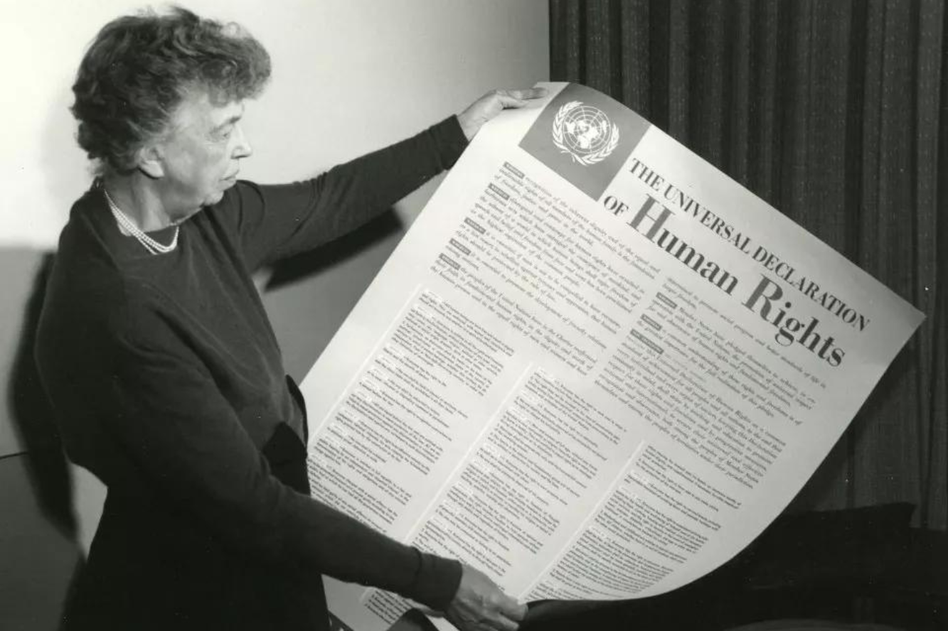
1948: UDHR
UN Universal Declaration of Human Rights
One of the most important milestones for human rights in the 20th Century, the United Nations Universal Declaration of Human Rights affirmed that “every individual and every organ of society”, businesses included, have responsibilities to promote fundamental rights. Drafted by representatives from different regions and countries, it remains the standard for human rights in the present day.
1970s
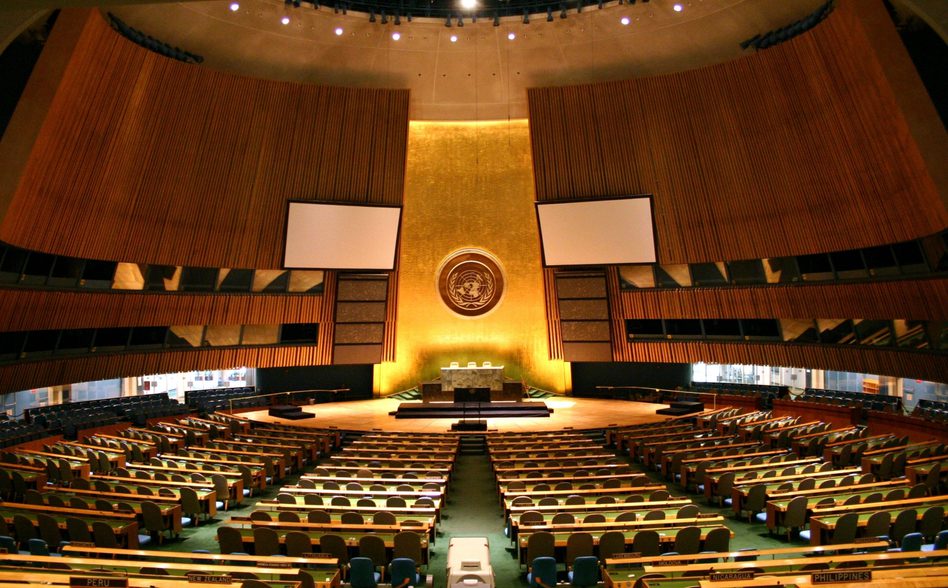
1974: Code of Conduct for Corporations
The UN General Assembly adopts a resolution calling for an “international code of conduct for transnational corporations” and the UN Economic and Social Council established an inter-governmental Commission on Transnational Corporations that would make recommendations on the possible contents of the code.
1976: OECD Guidelines
In response to sustained criticism of the role of multinational enterprises in the developing world, including concerns over corruption, the OECD Guidelines on Multinational Enterprises were adopted by member governments to encourage responsible business conduct around the world. The Guidelines were the first inter-governmentally agreed standard on responsible business conduct, most recently updated in 2023.
1977: The Sullivan Principles
The International Labour Organisation (ILO) adopts the Tripartite Declaration of Principles concerning Multinational Enterprises and Social Policy.
The Philadelphia-based Rev Leon Sullivan, who was a board-member of General Motors, campaigned for and succeeded in adoption of Sullivan Principles for American (and later other) companies to operate in a non-discriminatory manner in apartheid-era South Africa.
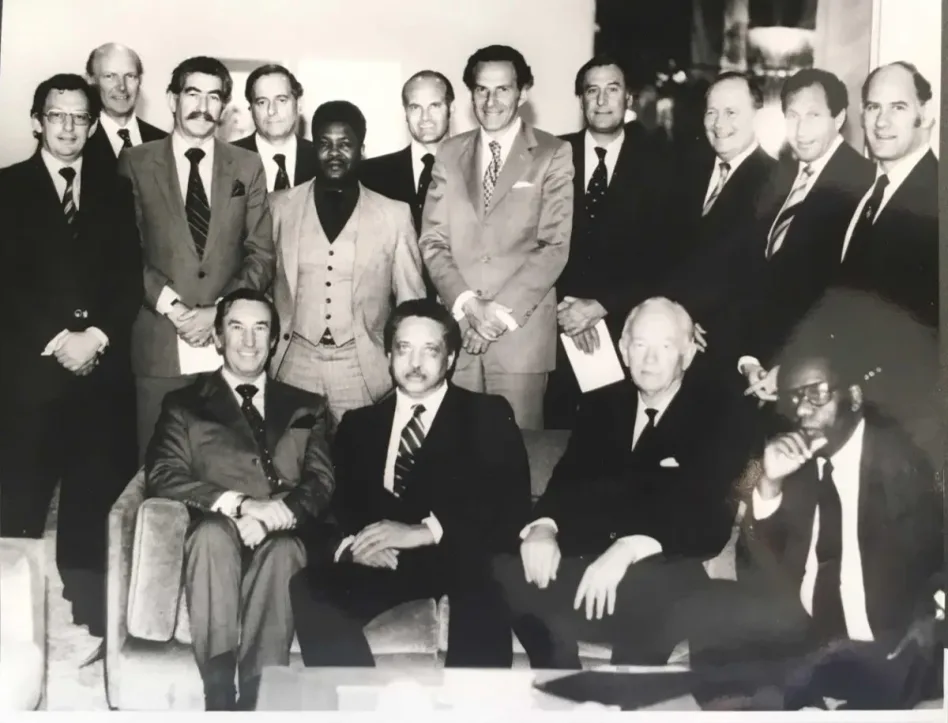
Leon Howard Sullivan papers, Stuart A. Rose Manuscript, Archives, and Rare Book Library. Source
1980s
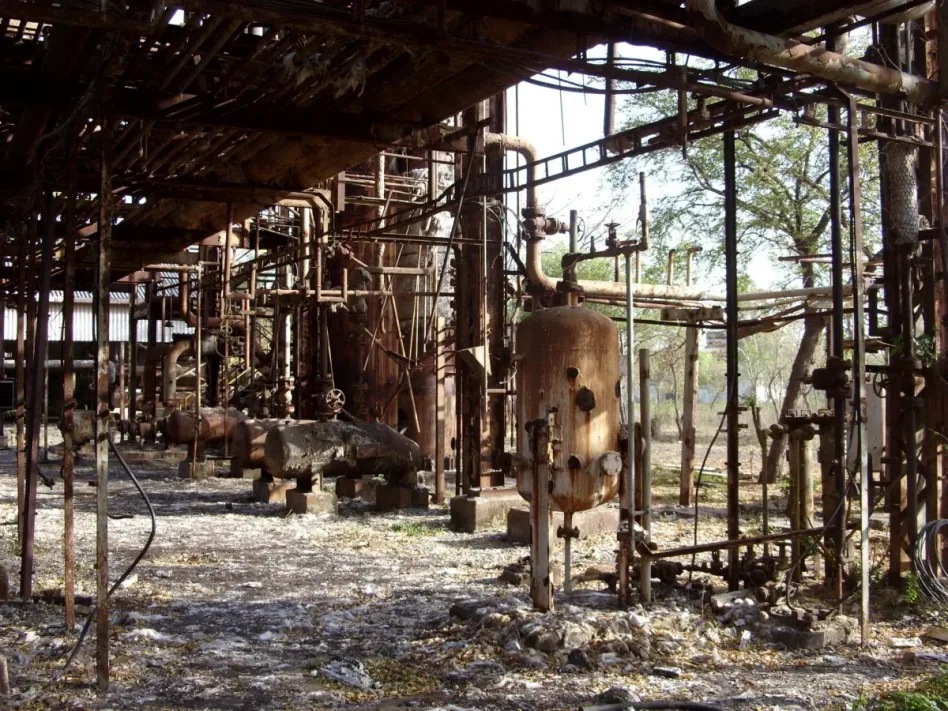
1984: Bhopal Disaster
A gas leak of methyl isocyanate at the Union Carbide plant in Bhopal, India, killed between 2,000-3,000 people instantly, and reduced the life expectancy of more than 12,000 people. This major industrial disaster has shaped conversations on corporate accountability ever since. The fight for justice for many survivors seeking remedy continues decades later, yet corporate impunity remains.
1990s
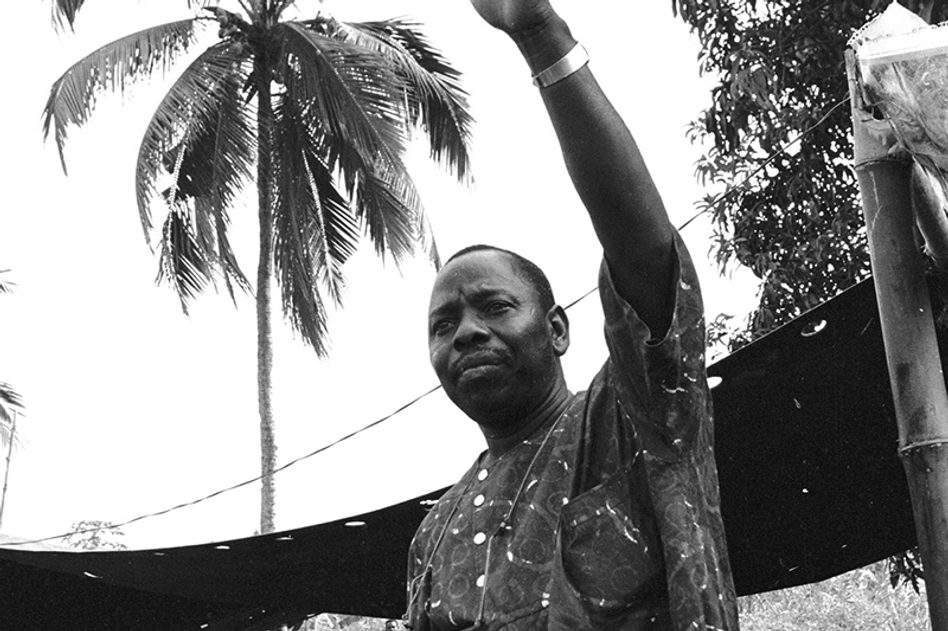
1994: The Ogoni Nine
The environmentalist and writer, Ken Saro Wiwa, who led the movement of the Ogoni people against the activities of Shell in Nigeria, was arrested with other Ogoni activists on spurious murder charges.
1995: Ken Saro Wiwa
A year later, despite appeals from the US and the UK Governments, the Commonwealth, and Shell officials, nine Ogoni leaders, including Saro Wiwa, were executed.
The same year, Shell was embroiled in another controversy, when it decided to decommission its floating storage and tanker loading facility, which had no further value in the North Sea. Greenpeace and other organisations opposed this action.
Amnesty International and Human Rights Watch began examining the conduct of extractive and apparel companies in the developing world and Greenpeace led new campaigns on environmental concerns.
1998: Human Rights Principles for Companies
Amnesty International began a dialogue with Shell, leading to the publication of its human rights principles for companies. Its business groups, comprising corporate executives, academics, and activists, began dialogues with businesses, raising human rights concerns. Amnesty International’s UK Business Group pioneered these approaches, and its founder, Sir Geoffrey Chandler, played an instrumental role in getting companies to take human rights seriously and getting human rights organisations to take companies seriously. In 2018, IHRB commemorated Sir Geoffrey’s contribution by facilitating his papers to be archived at Oxford.
Human Rights Watch published its path-breaking report, The Price of Oil about the Ogoni crisis in the Niger Delta, accusing Nigerian security forces of human rights violations and raising questions about Shell’s conduct and relationship with the security forces, making it among the first reports by a human rights organisation linking a company with human rights abuses.
2000s
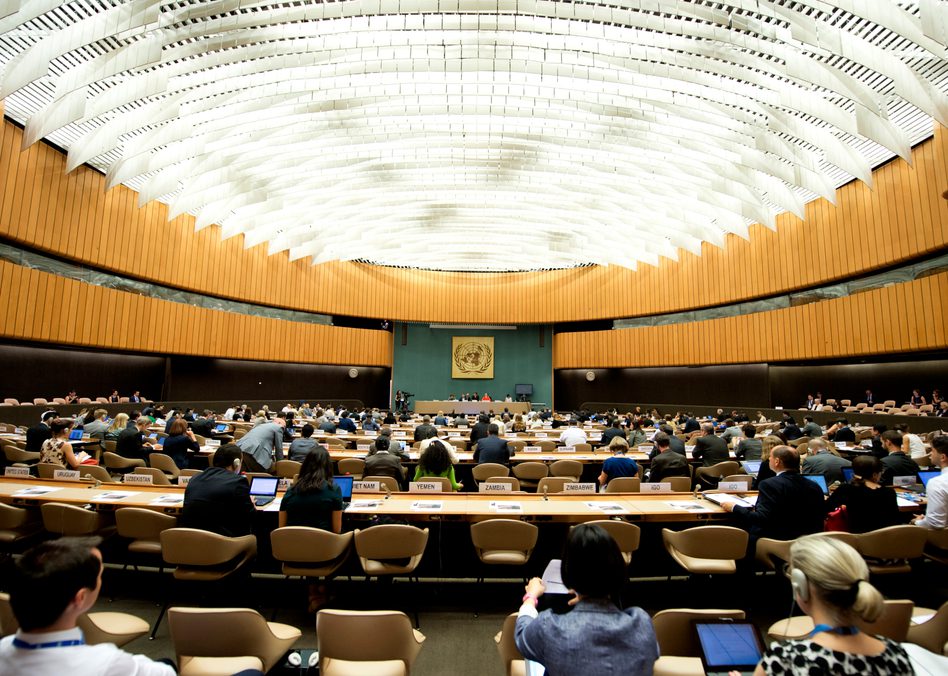
2000: A Global Compact
Following the collapse of trade liberalisation negotiations at the World Trade Organisation summit in Seattle in 1999, UN Secretary-General Kofi Annan launched in 2000 a Global Compact between business and society. Later that year, the Compact was launched with nine principles (later expanded to ten) of which the first two dealt with human rights, three dealt with environment and sustainability, and four with labour rights. The tenth principle, subsequently addd, deals with business responsibilities to combat corruption.
2000: Voluntary Principles for Security and Human Rights
The US and UK Governments worked with companies like Shell and BP and NGOs like Amnesty International and Human Rights Watch, to draft and adopt the Voluntary Principles for Security and Human Rights for the extractive sector, to address the risks posed to human rights due to the actions of private or public security forces. The crises in Nigeria (involving Shell and other companies), Colombia (BP), and Indonesia (Freeport McMoran) prompted the action.
2003: The Kimberley Process
Abuses connected with the extraction of diamonds from the conflict zones of Sierra Leone, Liberia, the Democratic Republic of Congo, and Angola brought governments, industry, and NGOs together to form the Kimberley Process Certification Scheme, to eliminate conflict diamonds from entering legitimate international trade.
Concerns over corruption led governments and companies to work with civil society groups to establish the Extractive Industry Transparency Initiative.
Over the years, several other multi-stakeholder initiatives were launched to deal with a range of industries, including apparel, minerals, and technology.
The UN Sub-Commission on the Promotion and Protection of Human Rights proposed Norms for business and human rights.
In 2003, seven companies joined the Business Leaders Initiative on Human Rights (BLIHR). The initiative, which grew to 13 companies, worked for seven years with the objective of finding practical ways of applying the aspirations of the UDHR to the business context. This included sharing good practices, as well as ‘road-testing’ the UN Sub-Commission Norms.
Many governments and businesses opposed the Sub-Commission Norms because in their view, state obligations were potentially being transferred to private actors who had neither the legitimacy nor the capacity to exercise such authority. The UN Human Rights Commission, while acknowledging "useful elements and ideas for consideration" decided that no further action to advance the Norms should be taken.
2005: UNGPs Appointment
A new Commission resolution called on Secretary-General Kofi Annan to appoint a special representative for business and human rights, based on a Commission mandate to ‘identify and clarify’ human rights standards that apply to business. Annan appointed John Ruggie, a former senior UN official and Harvard professor, as the SRSG on business and human rights.
Ruggie began a six-year process, which included dozens of country visits and consultations with business, academia, governments, civil society groups, and human rights defenders.
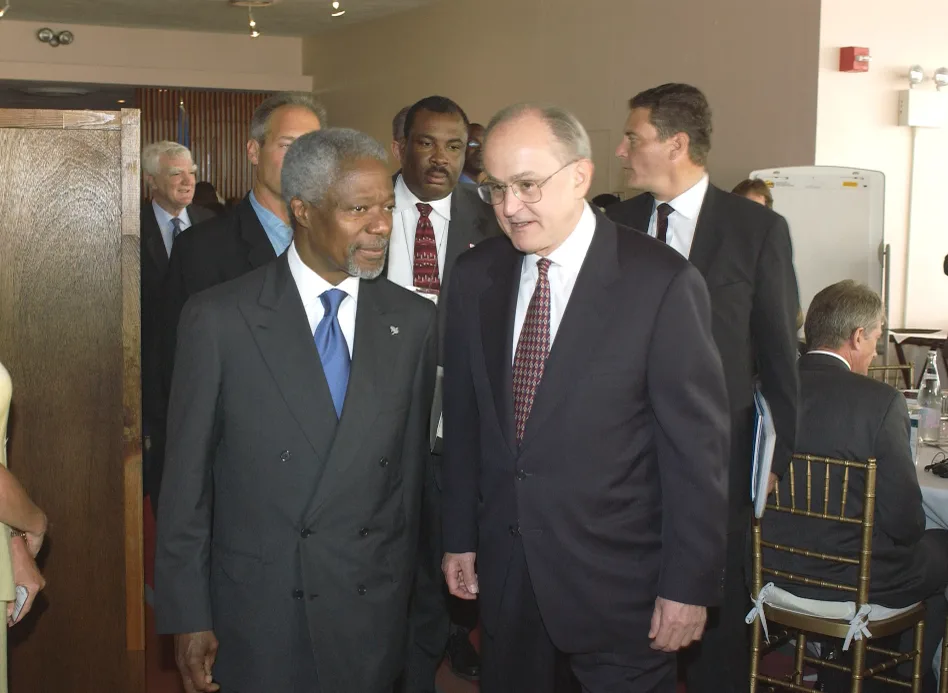
Ruggie with UN Secretary-General Kofi Annan in 2004. Source
2006: Worldbank's Performance Standards
The International Finance Corp., the private sector lending arm of the World Bank Group, published its Performance Standards to guide its borrowers/clients to operate in a way that mitigates human rights and environmental risks.
2008: Founding IHRB
The BLIHR process ended in Paris, at a ceremony marking the 60th anniversary of the proclamation of the UDHR.
The Institute for Human rights and Business (IHRB) was founded by Mary Robinson, the former United Nations High Commissioner for Human Rights and former President of Ireland, who served as its inaugural Chair and since as its Patron. Chris Marsden became deputy chair (and is also a patron).
IHRB’s subsequent Chair was the late John Ruggie, author of the United Nations Guiding Principles on Business and Human Rights.
2010s
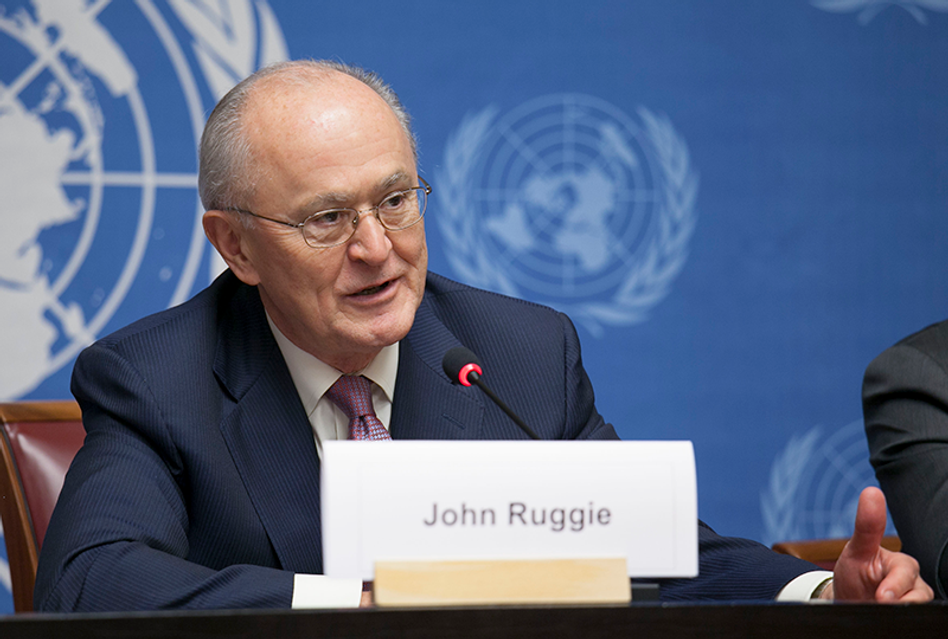
2011: The UN Guiding Principles on Business and Human Rights
The UN Guiding Principles on Business and Human Rights, the final product of John Ruggie’s work as UN Special Representative, were unanimously endorsed by the Un Human Rights Council .
As the Arab Spring unfolded, governments began to crack down on dissent. In Egypt, the government required telecom operators to shut down access to telecom and the companies complied, leading to global outcry. IHRB began work on the telecom sector, with its reports on digital dangers (network shutdowns, dual use technologies, and dissemination of hate speech) besides other projects.
2012: UN Working Group for Business and Human Rights
A UN Working Group for Business and Human Rights, comprising five independent experts, was formed, and an annual forum of business and human rights practitioners in Geneva was mandated by the UN Human Rights Council, both as follow up initiatives to the UNGPs.
The tragic deaths of 25 Chinese cockle pickers in Lancashire in the UK in 2004 increased focus on migrant workers worldwide facing unsafe conditions. Governments began to explore initiatives to end modern forms of slavery. The staging of Olympic Games in London led many organisations to lobby companies and Games organisers to pledge to improve working conditions for migrant workers. In that environment, IHRB worked with trade union organisations, civil society groups, international organisations, businesses, and governments, to develop the Dhaka Principles for Migration with Dignity.
IHRB published a report on sports and human rights and later launched the Centre for Sports and Human Rights in Switzerland in 2018, a human rights organisation for the world of sport.
IHRB’s work in Myanmar began during 2012 in the context of the country's newly launched democratic reform process following elections in 2010 that briefly ended military rule. IHRB co-founded the Myanmar Centre for Responsible Business, with offices in Yangon. Over ten years, it focused on five key sectors in Myanmar, published rankings of corporate transparency and disclosure, and advised companies on responding to human rights challenges.
2013: Collapse of Rana Plaza
Rana Plaza, a high-rise building in Dhaka, where many garment export factories were located, collapsed, killing more than 1,100 workers. Trade unions, consumer groups, and workers’ rights organisations built sustained pressure and campaigning which led to the establishment of the Accord on Fire and Building Safety in Bangladesh, and the Alliance for Bangladesh Worker Safety. Other demands included increased wages, safer conditions, and reform of the terms of trade.
Moves towards greater legal accountability of companies had mixed success. The US Supreme Court made it harder for human rights victims to sue companies in the US using the Alien Tort Statute, when it ruled against Nigerian claimants against Shell in the Kiobel case. Since 1984, US courts refused to hear claims against Union Carbide or Dow Chemicals over the Bhopal case. In 2023, an Indian Supreme Court ruling turned down an Indian government request to reopen the case. While cases against individuals such as Frans van Anraat had been successful, such remedies have been few and far between. Civil society groups have, since 2008, pointed out the dangers of complicity risks, identified as red flags. Two recent cases, involving Lundin executives are being tried in Sweden over its role in Sudan in the 1990s, and Lafarge Holcim is being tried in France over its presence in the former self-declared Islamic State.
2014: Intergovernmental Working Group on Transnational Corporations
Concerned about the uneven application of laws and the elusive nature of remedies, international civil society groups and some governments began the process to establish a binding instrument to regulate the activities of transnational and other business enterprises under international human rights law. The intergovernmental working group established by the Human Rights Council held its first session in 2015.
2015: Modern Slavery Act
The UK passed the Modern Slavery Act. The following year, IHRB launched the Leadership Group for Responsible Recruitment to improve practices in the recruitment of migrant workers and has since urged companies to adhere to the Employer Pays Principle.
The UN Framework Convention on Climate Change reached a landmark agreement in Paris, building on the pathbreaking Montreal Protocol of 1987, Rio Summit of 1992, and the Kyoto Protocol of 1997.
2017: LGBTQI Standards of Conduct for Business
In 2009, a Delhi-based NGO successfully challenged a colonial-era law in India, which criminalised same-sex relationships. In 2013, the Indian Supreme Court overturned the case. Progressive businesses in India supported LGBT rights and a nationwide movement followed. Meanwhile in 2014, Uganda passed a law imposing the death penalty on LGBT people and major international businesses protested and it was held in abeyance. In 2015, the United States Supreme Court legalised gay marriage. And in 2018, the Indian Supreme Court revoked its earlier ruling and decriminalised same-sex relationships. In 2019, Brunei passed a law imposing severe penalities on LGBT relationships. And in 2024, Uganda again passed a law criminalising same-sex relationships.
Many businesses actively supported LGBT rights - many published advertisements and ran campaigns supporting LGBT rights, and hundreds of companies in the US filed amicus briefs supporting gay marriage.
At the UN Human Rights Office, the Standards of Conduct for Business with regard to LGBTQI rights were developed by IHRB and partners.
With growing international need to assess, compare, and contrast corporate commitments to human rights, IHRB worked with other organisations to help set up the Corporate Human Rights Benchmark.
Meanwhile, the French Vigilance Law, requirements for increased reporting on environmental, social, and governance indicators, and greater calls for due diligence, which would later lead to the emergence of new standards in Europe.
2019: Brumadinho Disaster
The Brumadinho tailings dam of an iron ore mine operated by Vale S/A collapsed in Brazil, killing hundreds, which led to serious reconsideration among human rights organisations that rank companies based on corporate policies, by looking at impacts more seriously.
2020s
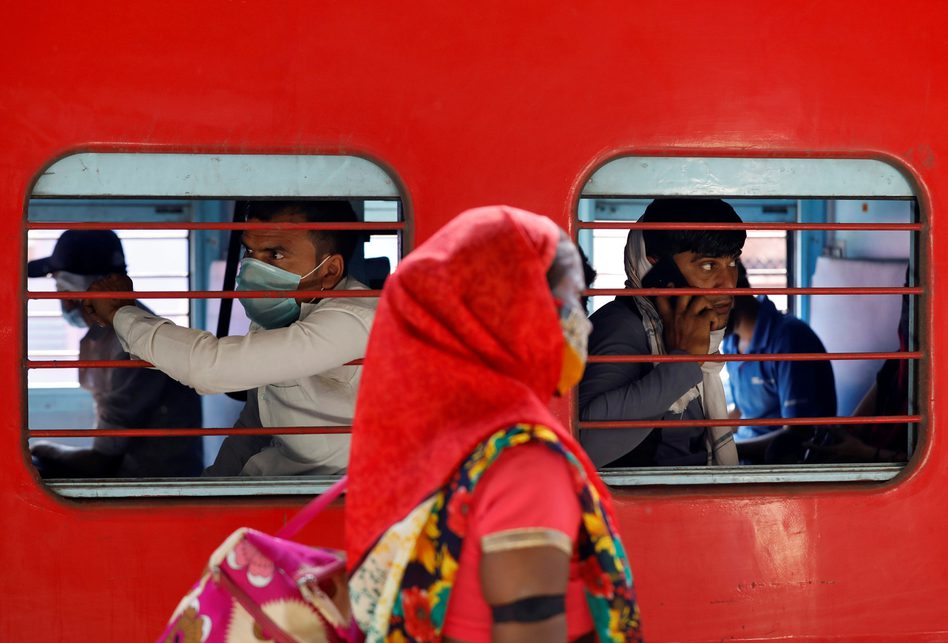
2020: Coronavirus pandemic
The global coronavirus brought sharp focus on the role of business in protecting its workers and communities in which they operate.
Rio Tinto admitted that it wrongly destroyed ancient sites, sacred to Australia’s Indigenous people, at Juukan Gorge, bringing into focus the relationship between companies and communities.
2021: European Union Corporate Sustainability Reporting Directive
A new standard becomes law. The European Union Corporate Sustainability Reporting Directive (CSRD), which requires some companies to disclose information on social and environmental risks and opportunities arising from their operations.
2024: Corporate Sustainability Due Diligence Directive
After much negotiation, the Corporate Sustainability Due Diligence Directive (EUCSDD) is passed into law, aimed at ensuring EU companies prevent and mitigate human rights and environmental harms within their operations in Europe and beyond.
In 2019, IHRB published the report: Building a Movement, Reflections on the History and Future of Business and Human Rights.